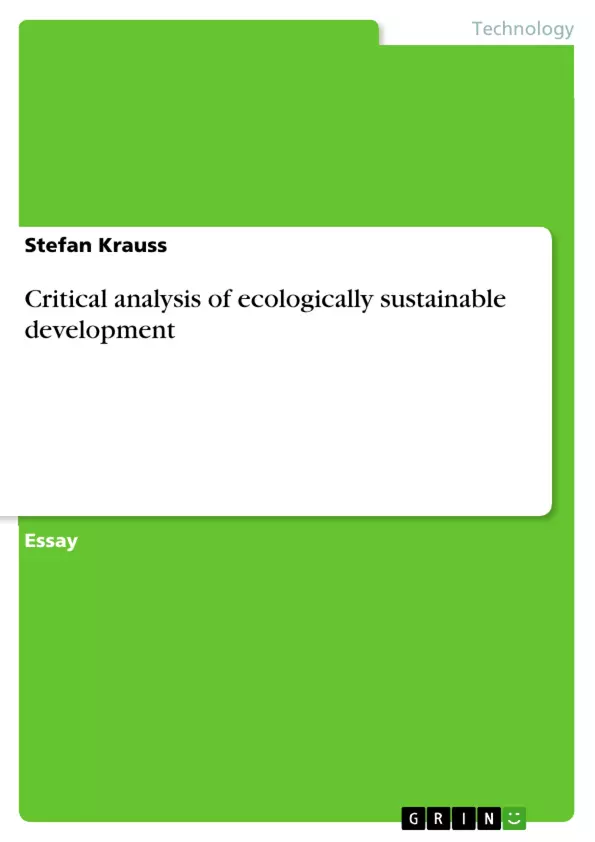QUESTION I-I: Based on the various readings and websites what, if any, seem to be the core 'agreed' principles of sustainable development and what are the key areas that are contested? Regretfully, the umbrella-term "sustainable development" is increasingly being used indiscriminately and arbitrarily, in both the scientific and the political discussion of sustainable development. The concept thus encourages increasingly arbitrary 'definitions'. For logical reasons, any concept which has to encompass almost everything (extension) must lose specific meaning (intension). However, after more then twenty years of debate about the term, one can identify an ethical profound core meaning as well as some clear contoured basic conceptions of "sustainability"1. The debate about "sustainability" refers, on a high grade of abstraction, to a way of life and economic manners that are capable for the future and which are grounded in moral obligations towards future generations and their life prospects. Thus, the orientation at intergenerational equity is constitutive for "Sustainability". In each conception of "Sustainability" there has to be answered the question which kinds of inheritance belong to a intergenerational legacy. To the pure moral perspective that deals with the question, if there are obligations towards future generations at all (e.g. Partridge 1990, Howarth 1992), there must in concreto be added power of judgement and reasoning that say something about kind, extend, and contend of the legacy. Here one moves in a scope discretion. [...]
Table of Contents
- Topic I: Sustainability contested
- QUESTION I-I: Based on the various readings and websites what, if any, seem to be the core 'agreed' principles of sustainable development and what are the key areas that are contested?
- QUESTION I-II: Describe your ideal sustainable world. How does this relate to the perspectives provided in the readings?
- Topic II: Global Challenges
- QUESTION II-I: What opportunities and threats do you see recent economic and socio-cultural processes of globalisation pose for the agenda of sustainable development?
- QUESTION II-II: Do you think current security tensions between 'the West' (especially UK, USA, and Australia) and 'the East' (especially Iraq, North Korea, and Indonesia) are relevant to sustainable development issues? If so, in what ways?
- Topic III: Community Challenges
- QUESTION III-I: What are the key social challenges posed by the ideal of sustainability for wealthy countries and for poor countries? How are these challenges different?
- QUESTION III-I: Why are participatory democracy and community involvement crucial to sustainable development?
Objectives and Key Themes
This text examines the concept of sustainability, exploring its contested nature, the challenges it presents in a globalised world, and the crucial role of community involvement in achieving sustainable development.
- The contested nature of sustainable development and its core principles
- The relationship between language and worldviews in shaping sustainability
- The opportunities and threats posed by globalization for sustainable development
- The social challenges and differences in implementing sustainability in wealthy and poor countries
- The significance of participatory democracy and community involvement for sustainable development
Chapter Summaries
Topic I: Sustainability contested
This section delves into the meaning and contested nature of sustainability. It explores the concept of intergenerational equity and different conceptions of sustainability, such as strong and weak sustainability. The chapter also examines the core 'agreed' principles of sustainable development and areas of contention.
Topic II: Global Challenges
This chapter explores the opportunities and threats posed by globalization for the agenda of sustainable development. It discusses the contradictory nature of globalization, highlighting its potential for creating both immense wealth and poverty. The chapter also examines the role of international institutions and the need for a powerful political framework to address the ecological and social challenges of globalisation.
Topic III: Community Challenges
This chapter focuses on the key social challenges posed by sustainability for both wealthy and poor countries. It highlights the importance of social capital in achieving sustainable development and the different challenges faced by different regions. The chapter also emphasizes the crucial role of participatory democracy and community involvement in fostering sustainable development.
Keywords
Sustainable development, intergenerational equity, strong sustainability, weak sustainability, globalization, social capital, participatory democracy, community involvement, global commons, international institutions, trade, investment, finance, environmental protection, social justice, gender equality, poverty, hunger, energy production, resource consumption, climate change.
Frequently Asked Questions
What are the core principles of sustainable development?
The core principles center on intergenerational equity, meaning we have a moral obligation to ensure future generations have the same life prospects as the current one.
What is the difference between "strong" and "weak" sustainability?
Strong sustainability argues that natural capital cannot be fully replaced by human-made capital, while weak sustainability suggests that different types of capital are interchangeable as long as the total stock remains constant.
How does globalization affect sustainable development?
Globalization offers opportunities for wealth creation but also poses threats like increased resource consumption, environmental degradation, and widening social inequality.
Why is community involvement crucial for sustainability?
Participatory democracy and local engagement ensure that sustainability measures are socially accepted, culturally appropriate, and address the specific needs of the people affected.
Are there different challenges for wealthy and poor countries?
Yes. Wealthy countries focus on reducing high consumption and carbon footprints, while poor countries often face challenges related to poverty alleviation, basic infrastructure, and social justice.
- Quote paper
- Stefan Krauss (Author), 2004, Critical analysis of ecologically sustainable development, Munich, GRIN Verlag, https://www.hausarbeiten.de/document/33616


